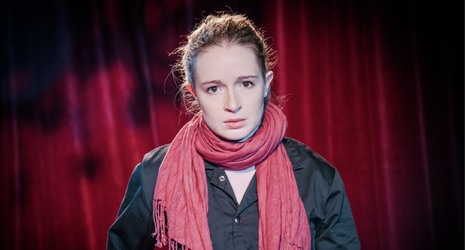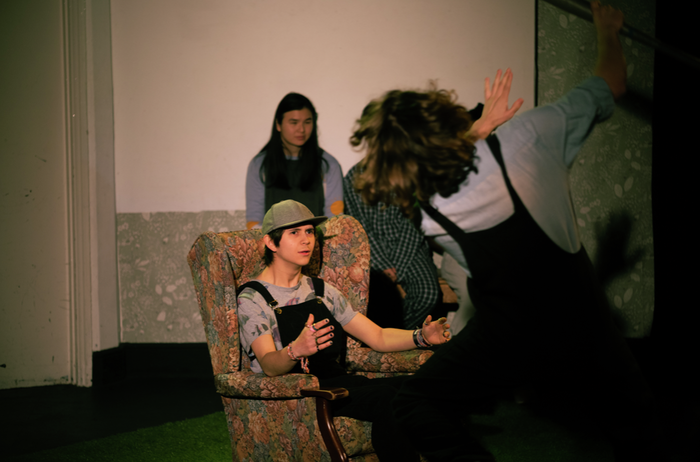A comrade and her radio: Tales from Star City
Theatre Editor Sophie Macdonald reviews Tales from Star City at the Town and Gown

Content Note: discussion of war in relation to the play
Awoman, her red scarf and the space race. This was all Christina Baston, who played Polina, needed for her stunning one-woman performance in Tales from Star City. The play tells the story of Polina, a radio engineer in the Soviet space programme during the cold war, who is enchanted by the lures of Socialism. From her birth, to her childhood, to the “death of her soul” Tales from Star City promises to explore the theories behind the scientific developments questioned by historians, and examine the essence of power and corruption. Its execution, however—while featuring some brilliant scenes by Baston—at times lacked the nuance a story of this weight requires.
“It was certainly Orwellian, but perhaps with less subtlety”
The play begins with a retelling of the day Polina was born: 30th January 1933, the day Hitler was sworn in as the chancellor of Germany. Quickly, the narrative shifts to Polina recalling a time where she was offered a liquorice sweet by a Nazi as her father was taken away, before the focus moves to after the war—which both she and her mother survive. The pair is taken in by Sasha, who, in the play, is merely a voice. A particularly interesting directorial decision was to meticulously stick to the one-woman show.
For a play so entrenched in very public historical events, director Dan Dawes portrayed the interiority of Polina’s character with dexteriteus ease. The audience receives Polina’s story as she figures it in her mind. By keeping the four other characters (Sasha, Olga, Volkov and Komarov) as voices, like words playing back to her from a radio, the impact that Socialist rhetoric has on Polina’s psyche is skilfully highlighted. Polina is told: “Having a radio is like having the ears of God” by her mother. But, instead of allowing that statement to stand alone, its power was slightly drowned out by a subsequent explanation for why it is Socialism: “us, its people,” that one should believe in. At times, it felt like the play was doing more telling than it was showing—it was certainly Orwellian, but perhaps with less subtlety.
“With nothing but her body and gestures, Baston is transformed into the machine”
Christina Baston’s never-faltering performance must be praised. Not once in the entire hour and a half did she slip-up or stutter. However, the true beauty of her performance did not just lie in the delivery of her lines, but the management of her body. When the voice of Volkov tells her that she is “part of a machine that will manufacture itself,” Polina is determined to “become the rocketship, the machine”—literally. With nothing but her body and gestures, Baston is transformed into the machine.
As the voice of Olga recites Polina’s daily routine in Closed Military Townlet No. 1, Baston comically mimics eating, going to the bathroom, and swimming, which received plenty of laughs from the audience. Baston’s mastery over her body was also undoubtedly perfected with the help of Dawes’ directorial vision, an expertise exemplified when Polina becomes a moving car. It was a shame, then, when the overly-loud cadences of some scenes yoked the audience out of the intimacy that could have been taken advantage of on the Town and Gown stage.
Polina’s scarf, her only prop, was also used very effectively. Doubling as a blanket, trumpet and military wear, the minimalist costume and set design worked well with the play’s focus on Polina’s body. This scarf is also used to transition between stages of Polina’s life, and, once she is entirely disenchanted by the end of the play, the scarf comes off. The voice of Volkov reminds Polina: “Curiosity is not a skill we like to foster in our USSR.” Thus, when she begins to ask: “Where is our utopia now?” her existence in Closed Military Townlet No. 1 can no longer be maintained and the play abruptly ends. After an incredibly emotionally taxing speech this abrupt ending feels jarring, but the audience is left with the residue of Baston’s impassioned moments as a substitute for a harmonious end.
Tales from Star City is a production that uses the body of its one character to tell a moving and important story. At the director’s curtain call, When the tour for the play was originally planned the cast and crew “never imagined the Cold War theme would suddenly become so pertinent.” Dawes emphasised that while this play bears no reference to Russia’s war with Ukraine, its themes about the abuse power and corruption ring true. And, it is because of this that Idle Discourse are keen to support victims in Ukraine with every performance, highlighting that although theatre is escapism: “we must not forget Ukrainian children and their families.”
Tales from Star City is showing at 7pm in the Town and Gown from the 10th - 11th May
 News / University Council rescinds University Centre membership20 February 2026
News / University Council rescinds University Centre membership20 February 2026 News / Hundreds of Cambridge academics demand vote on fate of vet course20 February 2026
News / Hundreds of Cambridge academics demand vote on fate of vet course20 February 2026 News / Union cancels event with Sri Lankan politician after Tamil societies express ‘profound outrage’20 February 2026
News / Union cancels event with Sri Lankan politician after Tamil societies express ‘profound outrage’20 February 2026 News / Judge Business School advisor resigns over Epstein and Andrew links18 February 2026
News / Judge Business School advisor resigns over Epstein and Andrew links18 February 2026 News / Caius students fail to pass Pride flag proposal20 February 2026
News / Caius students fail to pass Pride flag proposal20 February 2026












